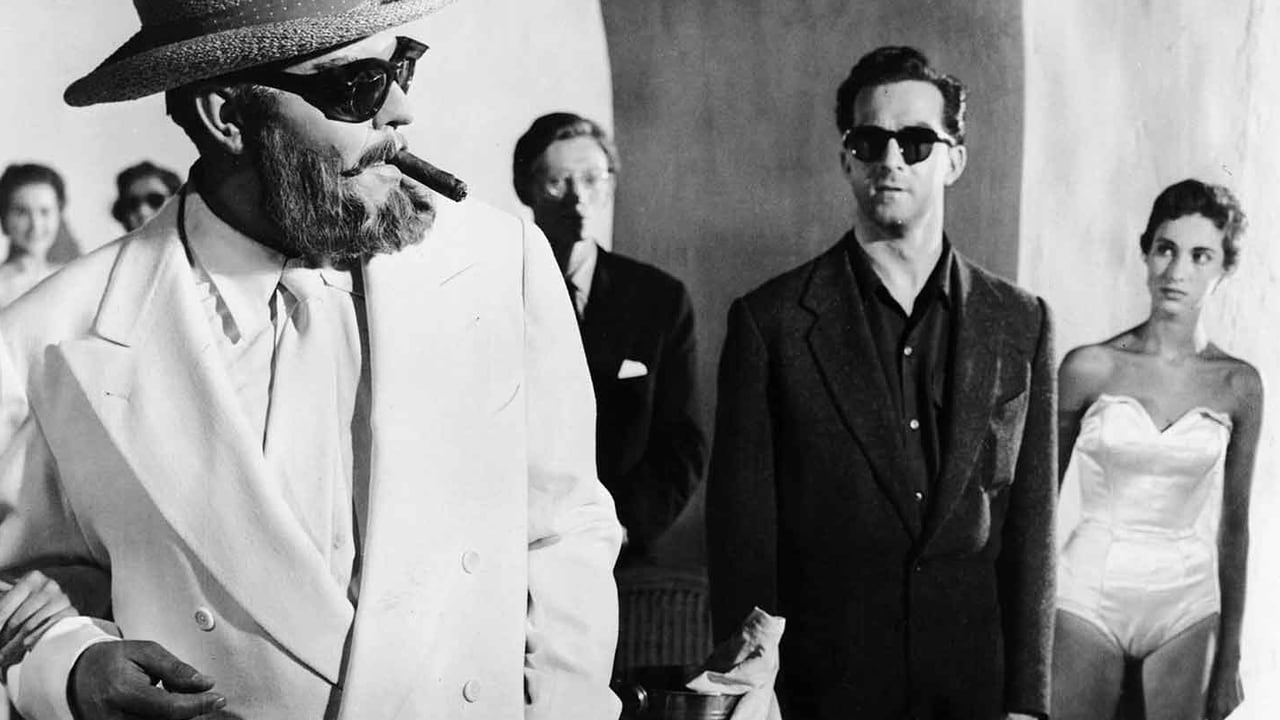

This is a film for Orson Wells fans and filmmakers.Don't press the pause button, to go to the frig, or you might not bother to resume play.A cross between Citizen Kane and Joe McDoaks, as in "So you want to be a Private Eye". It tries for meaning, symbolism, and is replete with clownish characters, and some creative camera work, but Fellini it is not.There is, unfortunately, no message. The sound is bad, and the dialogue is pedestrian.It is more like a homework assignment than entertainment, but then, I thought Citizen Kane and The Third Man were grossly overrated too.
... View MoreDefying All Reasonable Recitation, This Film is Another of Welles Extravagances that Spun Out of His Control in Post Production and Manifested a Life of its Own. Trying to Discern What it Was Supposed to Be or What it Is, for that Matter, is the Stuff of Scholarly Pursuits, Doctoral Thesis, and Criterion Collections.The Casual Film Buff Venturing Into Welles World, Especially His Late Term Efforts, is Likely to be Chewed Up, Spit Out, and Sent Sliding Into Incomprehensible Mutterings and a Desire for Firmer Ground.Solid Footing is Fleeting when it comes to Mr. Arkadin. There are So Many Versions, So Many Varying Prints, and So Many Rumors and Recollections that it is Best to Just Go with the "Comprehensive Version" and Leave "Welles" Enough Alone. Orson Welles was a Magician, a Curmudgeon, a Tinkerer, and a Tailor of Film that Loved to Play with His Craft Endlessly Until All Reason was Ripped This Way and That and Then Back Again.Few Knew or Have Been Able to Penetrate the Mind of this Filmmaker and Come Up with Anything Coherent or Understandable (a description of Arkadin), Although Mr. Bogdanovich and Others Certainly Gave it the Old College Try. Therein Lies the Endless Fascination with Orson Welles. A Puzzle of a Motion Picture Maker that is Forever Being Broken Up and Put Back Together, Although the Image on the Box is Always Different for Anyone Willing to Look. Mr. Arkadin is Perhaps Welles Most Fun Film. It is Bizarre, Disjointed, Awkward, Ill Fitting, and Absolutely Amazing and it Exists in a Select Universe of Films, Fit for Deconstruction Only by the Most Masochistic and Maniacal of Movie Fanatics. Others are Best Advised, for Peace of Mind, to Please Move Along and Play Elsewhere.
... View MoreThis fascinatingly bizarre recap of Citizen Kane pits the determined investigator (Robert Arden in his only starring role) against a subject (again flamboyantly played by Orson Welles) who is very much alive. In this round, Welles's screenplay ranges widely all over Europe, taking in such pictorially baroque splendors as a castle in Spain, a crate-laden Naples waterfront, ritzy fashion houses, wintry streets, desolate warehouses, a yacht tossing wildly in a raging sea. These are the self-imposed prisons not only of the supporting characters, but even of the broad-ranging Arkadin himself who is finally confined to the tiny cockpit of a small plane. To play the various cameos, Welles has assembled a first-rate castat least for the English-language version. I thought Suzanne Flon more effective than Spain's Amparo Rivelles, while Katina Paxinou way outshone Irene Lopez Heredia. (It must be admitted that Welles has directed these Spanish inserts rather slacklyif indeed he directed them at all. And they were certainly not photographed by Jean Bourgoin. Both are very brightly lit and neither have the noirish texture so brilliantly captured in the rest of the movie. And incidentally this is one reason I prefer the Corinth version to the others boxed in Criterion's splendid 3-disc set. The images are perfectly graded. And the dubbing is superior too. Welles decided to change some of the original dialog and was thus forced to re-dub many lines himself in the producer's re-edit called Confidential Report. That version has its moments, but over all, it was a grave mistake).
... View MoreCONFIDENTIAL REPORT (or MR. ARKADIN) has (if you look at the background notes) a complex history. It is supposedly based on a novel by Welles, which was actually written by a "ghost" writer, but it was then based on characters and situations from Welles' radio series as Harry Lime (based on the movie by Graham Greene and Sir Carol Reed - THE THIRD MAN), and then it has striking similarities to the basic structure of CITIZEN KANE (a wealthy powerful man is investigated by a reporter). As strip by strip this has been taken apart, older critiques are shown wanting. Peter Cowie's essay on the film in his book THE CINEMA OF ORSON WELLES is a pretty good one, given how poor the film versions were back in the 1970s, but he believed Welles wrote the book. Let's start from a point Cowie brought up - Arkadin may be based on figures like Sir Basil Zaharoff (the munitions dealer, known as "the Merchant of Death). One he mentions was Alfred Loewenstein, who I mentioned referring to two other films (SUCH MEN ARE DANGEROUS and GILDA) due to the interesting way he died - he fell out of his private airplane into the English Channel in 1928, and the exact reasons have never been settled satisfactorily - see the book THE MAN WHO FELL FROM THE SKY for the best discussion of the mystery). Thus the plane without a pilot is not as odd an opening as presented (although Loewenstein's staff and pilot were still in the plane when it finally landed). Starting from there the film does look like KANE, except in the exact details. For one thing, Charles Foster Kane died before the reporter is sent to investigate his life - and the scandals that crop up, or failings, or successes are well known to the public. But Kane, for all his failings, is part of the American power circle and social scene. Arkadin is a would-be billionaire too, but he does not make his fortune from mining, real estate, and newspapers, but from dealing with opportunists around the globe (we learn he sold defective military equipment to the Italians in the late 1930s). He has more of a hit-and-run type of approach that Kane (who barely cared for his fortune) never had - at one point he calls up his minions to "Buy Copper", which by the way is not as simplistic an order as one critic suggests (not Cowie) but exactly what someone like Arkadin would say to his minions after discussing the matter with them before.The original KANE screenplay by Herman Mankiewicz had a sequence in which Kane killed a man over Susan Alexander. This was based on the rumor (still debated, possibly unfairly) that William Randolph Hearst shot Thomas Ince on his yacht. Welles took this out of that script except for a bit about Raymond the butler knowing where all the bodies were buried. This is actually an improvement on that script, as Charles Kane's failings don't really seem to include a desire for corpses.Kane's tragedy is that he is desperately trying to be everything to everyone and yet remain his own master. His character is one of the most complex in American films (at least up to 1941 - possibly up to 2007). Arkadin's tragedy is a realization he is a creature of the nightmare world - a scorpion - desperate to make his daughter's world better at all cost. But if he is from the gutter, what if his former associates try to blackmail her? What would she think of him by their revelations? Charley Kane lost his normal growing up when his mother did what she mistakenly thought was smart: take him away from his drunken father and give him all the warmth of Thatcher's bank. Gregory Arkadin left the slime of the European swamplands for the grandeur of international finance and castles in Spain, and a British Marquis fiancé for his Raina, always aware that if your base was a swamp you can still fall back into it.So there are differences in the two figures as well as similarities. I first saw ARKADIN in 1973 on late night television. The version I saw apparently was the horribly botched cut version of the distributors in the U.S. in the 1950s where sequences flew about without keeping the rhythm of the film or it's sound track in tact (best example: this version has Van Stratton trying to get information out of Oscar (O'Brady - Sophie's husband) while denying him drugs on a boat - but we are shown the latter before we see the boat where this is going on!). I was impressed at sequences with Mischa Auer and Michael Redgrave, and that was about it. Since then more complete versions have turned up on video which make more sense. It's not in the front rank of Welles' best (KANE, AMBERSOMS, MACBETH, OTHELLO, CHIMES AT MIDNIGHT, TOUCH OF EVIL - maybe THE TRIAL) but it holds up as well as say LADY FROM SHANGHAI or THE STRANGER. The worst thing is the vagueness of the sound, (a problem of all of Welles' independent productions in Europe). I think it is definitely worth watching, but certainly not in that grotesque 1950s American version.
... View More